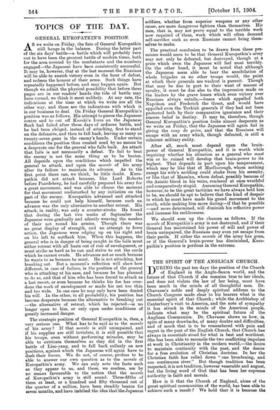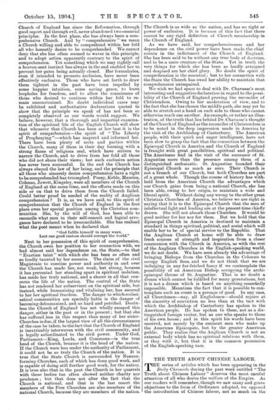D IMING the past ten days the position of the Church
of England in the Anglo-Saxon world, and the future of that Church if she remains true to her ideals, and does not violate the law of her being, must have been much in the minds of all thoughtful men. Dr. Chavasse's noble and deeply spiritual address to the Church Congress made clear to his hearers what is the essential spirit of that Church ; while the Archbishop of Canterbury's visit to America, and. the note of sympathy it has struck in the minds of the American people, indicate what may be the spiritual future of the Anglican Communion. Dr. Chavasse shows us how, in spite of many drawbacks, of many doubts and difficulties, and of much that is to be remembered with pain and regret in the past of the English Church, that Church has always in essentials stood for what is best and worthiest. She has been able to reconcile the two conflicting impulses at work in Christianity in the modern world,—the desire to maintain continuity with the past, and the desire for a free evolution of Christian doctrine. In her the Christian faith has rolled down "one broadening, and one continuous river." But though tradition has been respected, it is not tradition, however venerable and august, but the living word of God that has been her supreme authority in faith and morals.
How is it that the Church of England, alone of the great spiritual communities of the world, has been able to achieve such a result? We hold that it is because the Church of England has since the Reformation, through good report and through evil, never abandoned two essential principles. In the first place, she has always been a com- prehensive Church. And by " comprehensive " we mean a Church willing and able to comprehend within her fold all who honestly desire to be comprehended. We cannot deny that she has often seemed to waver in this principle, and to adopt action apparently contrary to the spirit of comprehension. Yet something which we may rightly call a heaven-sent instinct has always in the end enabled her to prevent her gates being actually closed. Her formularies, even if intended to promote exclusion, have never been effectively exclusive. Those who have set forth to draw them tightest in the past have been impelled by some happier intuition, some saving grace, to leave loopholes for freedom, and to allow the consciences of those who desired to continue within her fold to re- main unconstrained. No doubt individual cases may be exhibited and authoritative declarations quoted to show that the principle we speak of has not been so completely observed as our words would suggest. We believe, however, that a thorough and impartial examina- tion of the spiritual life of the English Church will show that whenever that Church has been at her best it is the spirit of comprehension—the spirit of "The Liberty of Prophesying "—which has inspired and informed her. There have been plenty of sects and parties within the Church, many of them in their day burning with a strong flame of religious zeal, which have striven to narrow the Church, and to drive from her fold all those who did not share their views ; but such exclusive action has never been successful. In the end the Church has always obeyed the law of her being, and the principle that all those who sincerely desire comprehension have a right to be comprehended has triumphed. Pusey, Keble, Maurice, Colenso, Jowett, Kingsley, were all members of the Church of England at the same time, and the efforts made on this side or on that to drive them from the Church failed. Could better proof be needed of the reality of Anglican comprehension ? It is, as we have said, to this spirit of comprehension that the Church of England in the first place owes her special position among the Christian com- munities. She, by the will of God, has been able to reconcile what men in their self-conceit and logical arro- gance have declared to be irreconcilable. She has realised what the poet meant when he declared that "God fulfils himself in many ways, Lest one good custom should corrupt the world."
Next to her possession of this spirit of comprehension, the Church owes her position to her connection with, we had almost said her dependence on, the State,—to that " Erastian taint" with which she has been so often and so loudly taunted by her enemies. The claim of the civil Magistrate to exercise power and authority in and over the Church has made her, not weak, but strong, because it has prevented her standing apart in spiritual isolation, has made her truly national, and a sharer in all that con- cerns the life of the nation. The control of the State has not rendered her subservient on the spiritual side, but instead, while humanising and vitalising her, has secured to her her spiritual freedom. The danger to which ecclesi- astical communities are specially liable is the danger of becoming dehumanised, and so hard and petrified. Doubt- less the Church of England has not wholly escaped this danger, either in. the past or in the present ; but that she has suffered less in this respect than many of her sister- Churches is due, if the largest view of all the circumstances of the case be taken, to the fact that the Church of England is inextricably interwoven with the civil community, and is legally subordinated to the civil power. Under God, Parliament—King, Lords, and Commons—is the true head of the Church, because it is the head of the nation. If the Church were less under the authority of Parliament, it could not be so truly the Church of the nation. It is true that the State Church is surrounded by Noncon- forming Churches, each of which has done good work, and is capable of doing still further good work, for the nation. It is true also that in the past the Church in her quarrels with these bodies too often showed neither charity nor prudence ; but that does not alter the fact that the Church is national, and that in the last resort the members of the Free Churches are also members of the national Church, because they are members of the nation. The Church is as wide as the nation, and has no right or power of exclusion. It is because of this fact that there cannot be any rigid definition of Church membership in the Church of England.
As we have said, her comprehensiveness and her dependence on the civil power have been made the chief counts in the indictment of the Church of England. She has been said to be without any true body of doctrine, and to be a mere creature of the State. Yet in truth the very things for which she has been so loudly arraigned and despised are her chief glory. No doubt the spirit of comprehension is the essential ; but to her connection with the State the Church has owed her ability to maintain that comprehension unimpaired.
We wish we had space to deal with Dr. Chavasse's most interesting and suggestive declaration in regard to the possi- bility of the Church of England proving the reconciler of Christendom. Owing to her moderation of view, and to the fact that she has chosen the middle path, she may yet be able to stretch out a hand on each side to those who cannot otherwise reach one another. An example, or rather an illus- tration, of the truth that lies behind Dr. Chavasse's thought of the Church of England as the reconciler of Christendom is to be noted in the deep impression made in America by the visit of the Archbishop of Canterbury. The American people, with their quick and eager intelligence, have not been slow to grasp the fact that the connection between the Episcopal Church in America and the Church of t Lifland is fraught with great possibilities, spiritual and political. The Americans find in the visit of the successor of St. Augustine more than the presence among them of a distinguished ecclesiastic. St. Augustine founded their Episcopal Church as much as ours. Their Church is not a branch of our Church, but both Churches are part of a great whole. Though the course of history has with- held from the American Church the advantages which our Church gains from being a national Church, she has been able, owing to her origin, to maintain a wide and liberal spirit. Without doing any wrong to the other great Christian Churches of America, we believe we are right in saying that it is to the Episcopal Church that the men of intellectual light and leading are at the present time chiefly drawn. She will not absorb those Churches. It would be good neither for her nor for them. But we hold that the Episcopal Church in America is destined to maintain a standard in things spiritual, political, and social which will enable her to be of special service to the Republic. That the Anglican Church at home will be able to draw fresh sources of strength and inspiration from a closer communion with the Church in America, as with the rest of the Anglican Churches in the English-speaking world, we do not doubt. We have seen already the advantage of bringing Bishops from the Churches in the Colonies to occupy English Sees, and we do not think that we are indulging in any far-fetched fancy if we contemplate the possibility of an American Bishop occupying the archi- episcopal throne of St. Augustine. That is no doubt a dream which cannot be fulfilled for many generations, but it is not a dream which is based on anything essentially impossible. Meantime the fact that it is possible to con- template such an event is a presage of good. In any case, all Churchmen—nay, all Englishmen—should rejoice at the sincerity of conviction no less than at the tact with which the Archbishop of Canterbury has spoken to the American people. He has spoken to them, not as a dis- tinguished foreign visitor, but as one who speaks to those of his own house ; and in this spirit his words have been received, not merely by the eminent men who make up the American Episcopate, but by the greater American public. They realise that the Anglican Church is not an external body which has no spiritual relations with them, or they with it, but that it is the common possession of the English-speaking race.











































 Previous page
Previous page